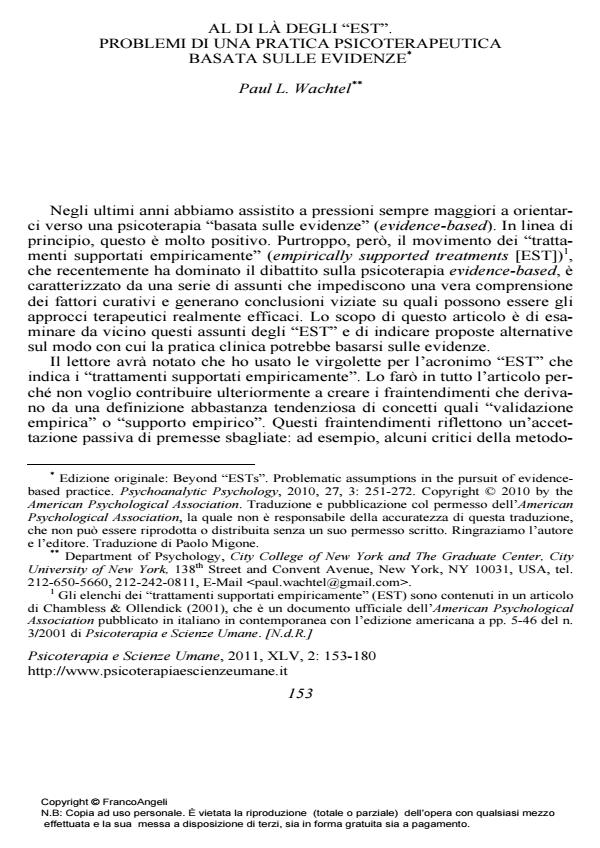Beyond "ESTs". Problematic assumptions in the pursuit of evidence- based practice
Journal title PSICOTERAPIA E SCIENZE UMANE
Author/s Paul L. Wachtel
Publishing Year 2011 Issue 2011/2
Language Italian Pages 28 P. 153-180 File size 561 KB
DOI 10.3280/PU2011-002002
DOI is like a bar code for intellectual property: to have more infomation
click here
Below, you can see the article first page
If you want to buy this article in PDF format, you can do it, following the instructions to buy download credits

FrancoAngeli is member of Publishers International Linking Association, Inc (PILA), a not-for-profit association which run the CrossRef service enabling links to and from online scholarly content.
There has been much confusion in the literature of psychotherapy research on the difference between the broad concept of evidence-based practice and the narrower set of criteria that have been employed in designating certain treatments as "empirically validated" or "empirically supported". In contrast to the appropriate concern with examining the evidence for the efficacy of various psychotherapies and for the theoretical assumptions that underlie them, the "empirically supported treatments" (EST) movement has been characterized more by ideology and faulty assumptions than by good science. This paper examines in detail the scientific and logical limitations of the "EST" movement and aims to place the empirical investigation of theory and practice in psychotherapy on a sounder basis.
Keywords: Empirically supported treatments, EST, evidence-based practice, psychotherapy outcome, psychotherapy research
- Le due facce della psichiatria Paolo Migone, in RIVISTA SPERIMENTALE DI FRENIATRIA 2/2015 pp.49
DOI: 10.3280/RSF2015-002006 - Le risposte. Psicoanalisi e psicoterapia: teorie, pratiche e contesti multipli Paul L. Wachtel, in PSICOTERAPIA E SCIENZE UMANE 3/2016 pp.617
DOI: 10.3280/PU2016-003060
Paul L. Wachtel, Al di là degli "EST". Problemi di una pratica psicoterapeutica basata sulle evidenze in "PSICOTERAPIA E SCIENZE UMANE" 2/2011, pp 153-180, DOI: 10.3280/PU2011-002002